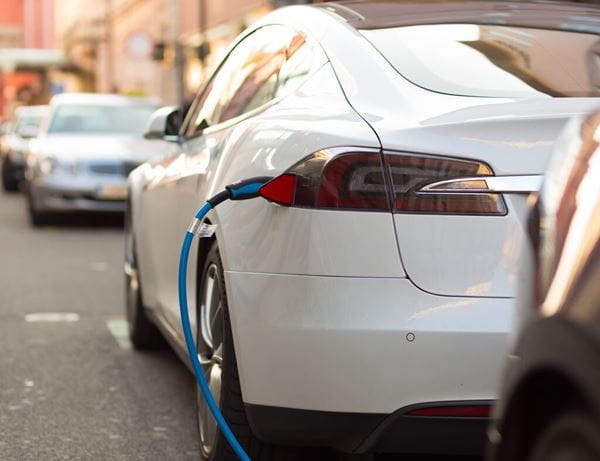
Getting Started: A quick guide to on-street EV charging
Convenient access to charging is an essential part of the UK’s electric vehicle transition, and there’s plenty of support for households that don’t have their own parking space.
Plugging in overnight is one of the biggest perks of driving an electric vehicle, and you don’t necessarily need a driveway or garage to do so.
A quarter (24%) of vehicles in England are parked on public highways, rising to a third (32%) in urban areas [1]. With sales of new combustion engine cars and vans set to be phased out by 2035, the Government is finding ways help those drivers make the switch. Here’s how.
Is there grant funding for on-street charging points?
Yes. In March 2024 the Government introduced financial support for homeowners and renters to install on-street charging points [2]. The grant provides up to 75% (capped at £350) towards the hardware and installation costs for those who own, lease or are the primary user (e.g. company car driver) of an eligible plug-in hybrid or electric vehicle.
However, the application process is slightly different to installing an off-street charger:
- Permitted development rights do not apply if the chargepoint is on a public highway, so it would require planning permission.
- Adequate local parking is a requirement, so drivers can’t block or restrict the road and must usually be able to park outside their property.
- A cable management solution must be installed before the charger, to reduce trip hazards. These are approved by local planning or highway authorities, and not always allowed.
Installing an on-street charger also doesn’t mean you own or have exclusive use of the adjacent parking space.
What Government support is available for on-street charging?
The On-Street Residential Charging Scheme(ORCS) launched in 2017 providing funding for local authorities to roll out infrastructure in areas where driveways and garages are less common. This has already funded thousands of chargepoints at the kerbside and in council-owned car parks, including some utilising electrical supplies for existing street lighting.
A further £15m was made available to local authorities in 2023/24, funding up to 50% of installation and equipment costs per charging point, capped at £7,500 per unit [3]. There is no maximum or minimum project size, but chargepoints must be available to residents 24 hours a day, seven days a week and maintained for seven years.
Councils, unitary authorities and combined authorities in England are also eligible for the Local Electric Vehicle Infrastructure (LEVI) fund. This is designed to accelerate the roll-out of chargepoints by covering hardware, electrical connection and installation costs, and applications are being processed tranches each financial year [4].
The LEVI also includes a Support Body, which offers free, impartial advice for local authorities looking to develop their charging strategy, provided by the Energy Saving Trust, Cenex and PA Consulting.
How do I request an on-street charging point?
The ORCS is a demand-led scheme, and residents can take an active role in getting that process underway. Local authorities are responsible for seeking permission from highways authorities and applying for funding, but the first step is contacting them to highlight where there is demand for chargepoints.
There are several ways to do this:
- A full list of UK council contact information is available on the Local Government Association website, here.
- Drivers can also register their interest through on-street chargepoint network operator Char.gy, who will lobby the relevant local authority on their behalf. Applications can be place here.
Funding is allocated on a case-by-case basis, and ORCS funding may prioritise areas that have poor air quality or haven’t been supported by other schemes.
Where can I go to check progress locally?
The BVRLA recognises that local authorities have an important role in developing a robust charging network, as well as the challenges they face with resources, funding and workloads. As a step towards further network growth, especially for fleets, the organisation has launched two key initiatives to support councils with their charging strategies:
- The Fleet-Friendly Charging Index maps authorities’ progress deploying charging infrastructure, and how carefully they are considering fleet needs.
- The Fleet Friendly Charging Pledge is designed to encourage closer collaboration between fleets and local authorities, ensuring charging meets the diverse needs of businesses and committing to putting strategies in place.
What do I need to consider if I can’t get a home chargepoint?
Despite the growing support for residential charging networks, it could take time to fill the gaps. Here are some important tips if you don’t have off-street parking:
- Be careful with cables: Section 178 of the Highways Act 1980 says it is legal to trail cables across, over or along a pavement, but only with the local authority’s permission [5]. Some will allow this, others see it as a trip hazard and will ask for it to be removed. Consider a brightly coloured cable protector to reduce the trip hazard and check your vehicle insurance includes cover for any damage.
- Charge at work: Although most plug-in hybrid and electric vehicles are registered to fleets, HMRC doesn’t tax electricity as a fuel. If your workplace has its own chargepoints and they’re free to use then the cost of the energy isn’t taxed as a Benefit-in-Kind, even if it’s for private use. This also applies if you’re carpooling using your passenger’s employer’s chargepoints.
- Use charging apps: Public charging is typically more expensive than plugging in at home, but there are several really useful smartphone apps to help find the cheapest local chargepoints. Zap-Map provides a live map of the UK’s myriad charging networks, including a filter which for locating units which are still free to use. The map is available here.
- Share with others: The Co Charger platform enables electric vehicle drivers with off-street chargepoints to share them with others when they’re not in use [6]. Payments are handled through an app, which enables hosts to set a per-hour fee and helps drivers to find them easily.
- Become a member: Most charging networks offer pay-as-you-go access using a contactless credit or debit card, but it’s often the priciest way to use them. BP Pulse, for example, offers a 16p per kWh discount on its fastest chargepoints if drivers pay a £7.85 monthly subscription fee [7]. A Kia Niro EV driver could recover those costs within a single (0-80%) fast charging session.
[1] UK Government. (2023). National Travel Survey: 2023 Data Tables. [online] Available at: https://assets.publishing.service.gov.uk/media/64e8c64e691aa3000da56e46/nts0908.ods [Accessed 24 May 2024].
[2] UK Government. (2023). Electric Vehicle Chargepoint Grant for Households with On-street Parking. [online] Available at: https://find-government-grants.service.gov.uk/grants/electric-vehicle-chargepoint-grant-for-households-with-on-street-parking-1#eligibility [Accessed 24 May 2024].
[3] UK Government. (2023). Grants to Provide Residential On-street Chargepoints for Plug-in Electric Vehicles: Guidance for Local Authorities. [online] Available at: https://www.gov.uk/government/publications/grants-for-local-authorities-to-provide-residential-on-street-chargepoints/grants-to-provide-residential-on-street-chargepoints-for-plug-in-electric-vehicles-guidance-for-local-authorities [Accessed 24 May 2024].
[4] UK Government. (2023). Apply for Local EV Infrastructure (LEVI) Funding. [online] Available at: https://www.gov.uk/guidance/apply-for-local-ev-infrastructure-levi-funding [Accessed 24 May 2024].
[5] UK Government. (1980). Highways Act 1980, Section 178. [online] Available at: https://www.legislation.gov.uk/ukpga/1980/66/section/178 [Accessed 24 May 2024].
[6] Co Charger. (2023). About Us. [online] Available at: https://co-charger.com/about-us/ [Accessed 24 May 2024].
[7] BP Pulse. (2023). Public EV Charging: Pricing. [online] Available at: https://www.bppulse.co.uk/public-ev-charging/pricing [Accessed 24 May 2024].

.jpg?rev=3adbd558867c4d92bf9f22752f12a09c&mw=600)

